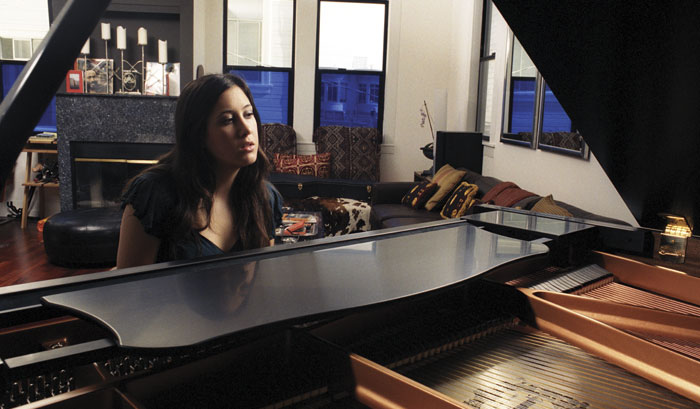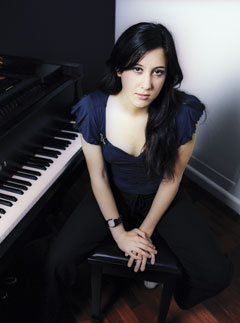


In her hit song, "A Thousand Miles," singer/songwriter Vanessa Carlton sees herself as "making a way through the crowd." Carlton does indeed stand out from the current crowd of young female singer/pianists. On her debut album Be Not Nobody, her heartfelt, confessional vocals combine with intricate, multi-layered piano and orchestral parts to create a distinctive whole.
Carlton's musical training began early. "My Mom was a piano teacher," she explains. "There were always a lot of other kids around, and a lot of music going on. I was much younger than most of them, but I was pretty adamant about wanting to be part of it. As the daughter, I got special privileges, and I loved sitting down at the piano."
When a melody comes out, it's always first expressed through my hands. I just sit down and start putting things together--it's kind of like a puzzle.
These special privileges included a selective approach to learning the piano. "I was able to get out of the theory and so forth," admits Vanessa. "I loved to play, but when it came to doing the exercises, I'd run upstairs and watch TV instead! I could always read music, but my mom didn't push me on the technical stuff-and in the end, it was quite all right."
Carlton's father provided the pop side of her early musical education. "At home, there was never any pop music on the radio-I only listened to classical music," she remembers. "I didn't have my own stereo or Walkman or anything. But I'd go on rides to the airport with my dad, who was a pilot, and he'd give me another kind of music lesson. So at four years old, I'd be introduced to all these bands. He'd say, 'Okay, Vanessa, this is the Grateful Dead.' And I'd ask, 'Are they dead?' And he'd very patiently say, 'No, they're not dead.' I learned a lot about different kinds of music from him, very early on."

As Vanessa grew older, did she ever want to rebel against the piano? "Never. I had such a feeling of camaraderie with the piano, due to my mother. She never taught me in a way that made me feel confined. There are times in life when you have to do things you don't want to- like in school, you have to do your homework. But she allowed me to learn piano on my own terms."
Carlton began composing piano music at the age of eight, and she still does most of her songwriting at the keyboard. "When a melody comes out, it's always first expressed through my hands," she says. "I just sit down and start putting things together-it's kind of like a puzzle. Since I don't know formally what the options for chords should be in different keys, when I do find the chords I want, they might not be the most typical ones. It makes things more interesting. The process becomes more about hunting or seeking. So I'll just play around, and then when something comes together, I start singing over it. I refine it by playing it over until it's a theme, then go on from there until it's a song."
Vanessa's experience with Yamaha pianos dates from her early years. "We always had a Yamaha at home," she says. "In fact, the Yamaha piano in my apartment in New York, a C2-it's the same one I grew up with. I've always loved the sound of that piano. It's very pristine and bright-it sounds more alive than a lot of pianos, and it's easier to play."
Vanessa chooses Yamahas in the studio as well. "On my first record, I played a Yamaha grand that sounds beautiful," she says. "But my second record will have a sound that's not quite so refined and perfect. I'm going for a slightly more beat-up piano with a distinct personality, like the one I have at home. There's a spontaneity I'd like to find that I haven't yet. I find recording really grueling, when you're searching for the perfect sound, as opposed to finding the right feeling and representing the song in a way that's not so thought-out. I want the music to come alive as it happens."
As a female songwriter who plays piano, how does Carlton feel about the inevitable comparisons with other female songwriter/pianists? "By now I'm familiar with the way the media works," she reflects. "It's easier to just say, 'Oh, she's like Fiona Apple or Tori Amos than to describe how my music is unique. I guess it makes it easier for people to find instant familiarity with new music, though it's kind of annoying. There are similarities between pianists, or guitarists, but comparing people only by the instruments they play seems a little too easy."
























